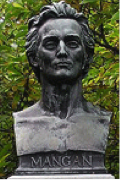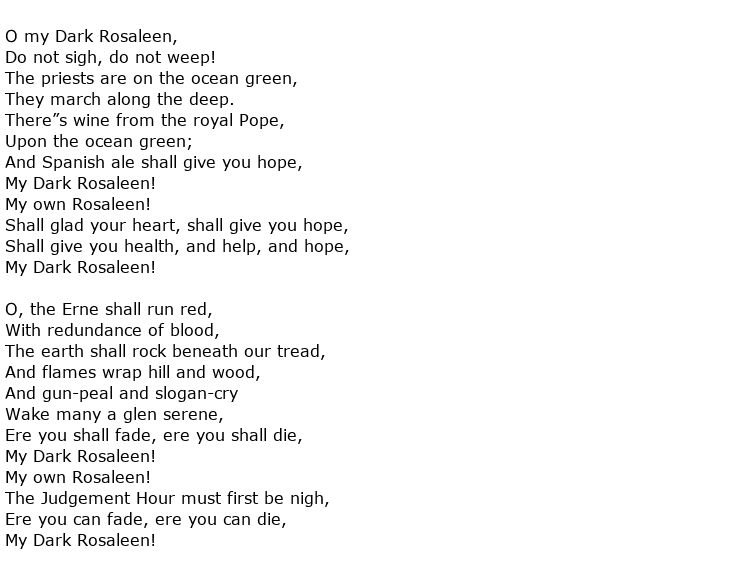 The Irish poet James Clarence Mangan rose from a fairly humble background in the early 19th century to become one of his country’s most accomplished writers. He wasn’t privileged enough to enjoy a great education and, in fact, attended a number of different schools. While at a Jesuit school he studied languages to the point where he would eventually produce decent translations of literature in a number of languages. Terrible events such as The Great Famine turned his mind to feelings of resentment and he was very much part of the Nationalist movement. His writing, much of it in Irish publications, won him the admiration of such famous poets as W B Yeats who bestowed this glowing tribute upon him:
The Irish poet James Clarence Mangan rose from a fairly humble background in the early 19th century to become one of his country’s most accomplished writers. He wasn’t privileged enough to enjoy a great education and, in fact, attended a number of different schools. While at a Jesuit school he studied languages to the point where he would eventually produce decent translations of literature in a number of languages. Terrible events such as The Great Famine turned his mind to feelings of resentment and he was very much part of the Nationalist movement. His writing, much of it in Irish publications, won him the admiration of such famous poets as W B Yeats who bestowed this glowing tribute upon him:

He was born James Mangan in Dublin on the 1st May 1803. His father was once a teacher but was now running a grocery business, none too successfully. While under the wing of one Father Graham at the Jesuit school, James learned the basic principles of French, Italian, Spanish and Latin. He later taught himself German and used that in numerous translations of Germanic literature. While he would have loved to have taken up a career using his academic skills James took a series of fairly menial jobs just so that he could provide his family with a little income. He hated working as a clerk and described it as:

He used his time well though as a library assistant at Trinity College, Dublin, reading all he could and honing his own poetry writing skills.
From the age of 15 he began submitting pieces of work, often using pseudonyms, to various publications. He would eventually find his work recognised by such as the Dublin University Magazine and Irish Monthly Magazine. He added the middle name Clarence when he was 17 and wrote fairly bland, certainly apolitical, poetry in the early stages. His writing took on a much harder edge though after famine swept Ireland. Two notable examples of this new style were My Dark Rosaleen or Róisín Dubh and A Vision of Connaught in the Thirteenth Century. Here are first and last verses of Dark Rosaleen:

In his early thirties Mangan produced a number of what were known as “free” translations of work by Goethe and he went on to translate work into English from the Irish, Arabic, Turkish and Persian languages. Despite being highly regarded for his own work he became morose and often presented an odd appearance to the world. He could be seen walking the streets in a blonde wig, green framed glasses and a long cloak. His health was beginning to suffer as his drinking habits got worse and he often fell into bouts of depression.
He made little money from his writing, drank too much and ate too little. He also had an opium habit. Mangan’s lifestyle made it inevitable that he would become so weak that he was unable to resist illness. He fell victim of a cholera epidemic and was admitted to hospital. He never came out. He had been found living in what was described as:

James Clarence Mangan died on the 20th June 1849, aged 46.

